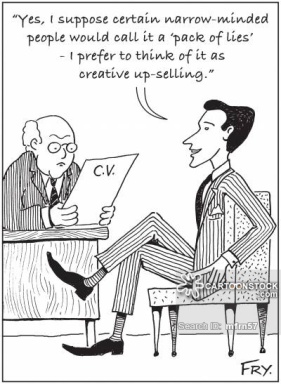In my “career counseling” posts, I usually write things from my point of view: what to do and what not do.
But this time is a bit different. I want to ask you if you believe that leaving something out of your CV is actually a lie.

For example, I hold quite a few diplomas and have experience at various levels.
When applying for a job that requires a Masters, should I leave my PhD out of my CV?
When applying for a job that requires 1-3 years of experience, should I leave some prior experience out?
The reason that I am asking this is because, well, I can`t find a job. The answers that I get, either before or after an interview (if I get there), is that I am either underqualified or overqualified.
I wouldn’t say it’s lie at all. My career advisor encouraged me to bend my applications so that it fit the job description as long as I wasn’t lying and as long as I could actually do the job if offered it.
LikeLike
“Bending” an application?!? That’s an interesting choice of words. In my opinion, I wouldn’t say that bending an application is not the same thing as adapting your CV to prove to the recruiter that you’re right for the job.
I understand that you’ll take out the job as a waiter during college if you’re applying for a position as a junior manager. But what I don’t understand is why people take out their education.
I’m an agronomist and proud to say. If I will apply for a job in external affairs, let’s say, I believe that my studies will help me…even if others don’t think so. In the end, it’s my job to prove that my background, my full background makes me the perfect candidate.
Don’t you think so?
LikeLiked by 1 person
I definitely think that if your background can prove you’re the right candidate then include it. In a way you’ve answered the question you asked in the post with that last bit, as I would say ONLY include what you think will present to the employer that you are the right candidate for the job, and if you’re making the application in the first place I would hope that already means you think you’re a suitable candidate — so don’t make that hard for the employer to see with red herrings. To emphasise that latter point: it’s always a good idea to remove things that may get in the way of the employer seeing that you’re fit for the position. You need to make it damn obvious, as they may be going through hundreds of applications. In other words: if it’s not relevant, do not mention it. I respect your level of integrity, and by bending your application I don’t think you’ll be jeopardising it, but you’re looking for a job, and increasing the “flexibility” of your applications is absolutely fine in any circumstance, but especially even more so when you haven’t got a job. After all, you have to eat.
LikeLike
I think we’re saying the same thing but with different words and expressions.
Thanks for giving me an idea for my next article. I’m excited in writing it :-). It will probably appear on Thursday afternoon.
LikeLiked by 1 person
A small P.S.: most (big) employees use screening software anyway. If you write the CV the right way and include the right keywords you’ll make to the first interview.
LikeLike
Agreed. I look forward to reading it. Really? Well, that’s efficient but lazy, but surely that’s a bit of a risk? I’ll look into that more. It’s a bit shocking but interesting.
LikeLiked by 1 person
One of the most used screening software does not accept heavy formatting in documents. So nothing like the Europass. For that software, you should use an .rtf document.
LikeLike